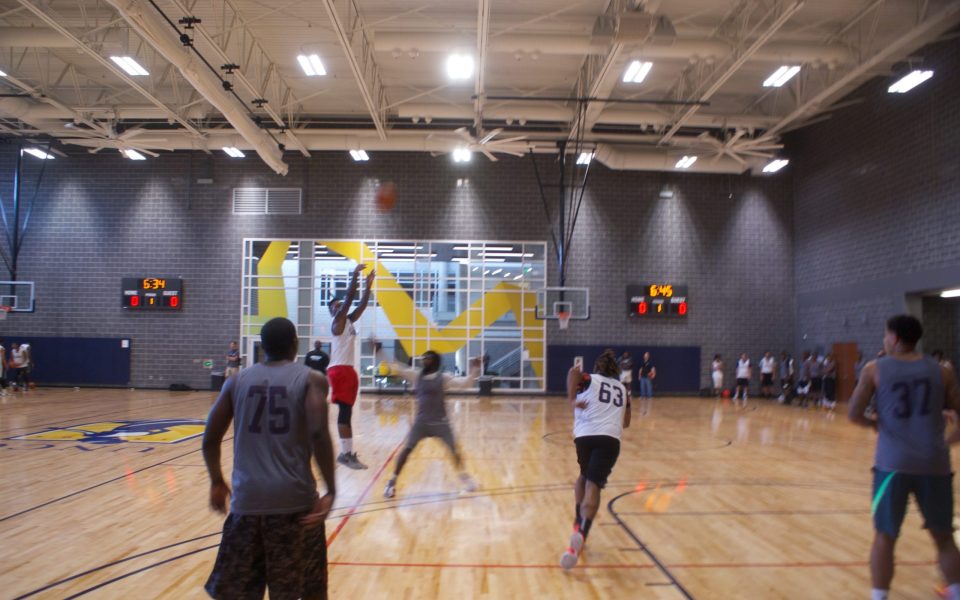by Anthony Harrison
You either got it or you don’t. And even if you do, you gotta have that special something.
The Greensboro Swarm, the newly established D-League team for the Charlotte Hornets, held an open tryout on Sunday. Ballers from up and down the Atlantic seaboard, from Florida to Maryland, filled the three-court gym of UNCG’s shiny new rec center as climbers scrambled up challenges on the 54-foot rock wall and fencers parried in the room next door.
They came from all walks of life — black, white, Latin, Asian. They ran the physical spectrum from ripped to lanky, long to rotund. Trash talkers, team players, ball hogs, pickpockets, sharpshooters, slamma-jammas running all kinds of drills, some I’d neither seen nor heard of — sprints, skips, jogs, lunges, suicides, the Spiderman, the Karaoke — all contributing to the cacophonic symphony of screeching sneakers on hardwood.
Yet they were all united in a common goal: Make the team for the outside shot at an NBA contract.
Supporters followed them the way a supply chain trails an invading army. Mothers, fathers, lovers and friends formed cheerleading corps for one-man teams.
Trainers and coaches tagged along as well, and once they recognized my motive, they wasted no time in pimping their protégés.
“Hey, you a photographer or a journalist?” they’d ask me. “I got a player you should write about. He’s been playin’ pro ball in the Philippines, real pro ball. These other guys, they got the talent, but him, he’s got a demeanor superior to these guys. Just watch ’im.”
And I’d watch ’im, alright, and he was good, surely. He was in great shape; he had the look of blind ambition in his eye. And he could pull up, pump fake, fade away, contest the shot, sacrifice the body against the charge, and slash and drive. But there were another couple dozen of him skittering around in the talent pool of 200 others, and even the ballers with some of the best-looking shots, the biggest ups, they wouldn’t make the final cut.
Because some got it, and some don’t.
Swarm head coach Noel Gillespie, a former assistant coach for the Denver Nuggets and the Phoenix Suns, laid out what he wanted from his potential recruits.
“I’m looking for role players,” Gillespie shot out to the assembly in short bursts with only the slightest pause between clauses, like suppressing fire from a machine gun. “I’m looking for how you pass the ball to the other man, not step back, iso, pulling up for the shot.
“Don’t be a hero,” he continued. “We’re all in this together. That’s playing basketball.”
Gillespie rambled out his team-play rants with the fervor and intensity of an evangelist, repeating that final phrase as a revival preacher might implore his congregation, “Can I get an amen?”
And he captivated his audience, and they believed in him, answering with applause.
The sidelines of the three-court gym burst with young men all clapping together as their scrimmaging teammates ran their medley of drills. They clapped even when the nervous among them jumped the gun and drilled before the whistle, when they lost the ball on the left-to-right cross, when they couldn’t throw their hands high enough while running suicides.
Sure, some had it and some didn’t, but at that point, nobody had much over anyone else.
What I saw were players all almost equally talented, strong on offense and defense; if deficient in one, making up for that lack with surplus on the other side of the spectrum. Even if their jump shots thunked off the back of the rim, they might follow up on the rebound and dunk the ball. And the short or slight among them who might get stuffed on the drive could swish from downtown at will.
Twenty teams soon scrimmaged in half-court pickup games, both in the main three-court gym and the smaller, two-court gym downstairs adjacent to the swimming pools.
“This is the classroom session,” Gillespie announced before the skirmishes began. “We’re not gonna pass and stand — this is position-less basketball. Instead of dancing with it, things are gonna flash. That’s playing basketball.”
Every player scrapped and fought for each possession, thudding to the floor after going up for the rebound, slashing into opposing players crowding the key in vain attempts to show off their agility.
They threw themselves into the fray because, to them, the game is everything, and they were not throwing away their shot.
I overheard Justin Ramsey, a 6-foot-11-inch, 31-year-old veteran of Virginia Union University in Richmond, outside of the two-court gym.
“I was working out with the [Orlando] Magic, but they were looking for top picks outta college, and I’m like, ‘You got someone right here, ready to go,’” he lamented.
Ramsey had driven four and a half hours from Chesapeake, Va. to try out for the team.
“I’ve just been trying to keep playing, because once you stop, that’s it,” he said.
The talent pool reflected the grim reality of the fractional chances that even great players face to play ball for money, but they all remained enthusiastic.
“It’s not the guys who score the most points, who grab the most rebounds,” Gillespie said of their search parameters. “It’s the guys that talk, the guys who hustle, the guys who play to the whistle.”
That’s the special something — intangible, un-coachable basketball IQ and self-discipline.
Join the First Amendment Society, a membership that goes directly to funding TCB‘s newsroom.
We believe that reporting can save the world.
The TCB First Amendment Society recognizes the vital role of a free, unfettered press with a bundling of local experiences designed to build community, and unique engagements with our newsroom that will help you understand, and shape, local journalism’s critical role in uplifting the people in our cities.
All revenue goes directly into the newsroom as reporters’ salaries and freelance commissions.


Leave a Reply